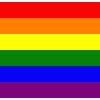
The Last Best Hope For Religious Continuity: Gays
By AARON HAMBURGER in The Forward
July 15, 2005
In an age when religious activists frequently lament that their faith is under constant attack by secularism, gays could prove to be religion's last best hope.
It's a lesson I've learned keenly from personal experience. As a child, I read the Bible literally and decided I wanted to become a prophet when I grew up. I imagined tasting an actual lump of coal to cleanse my tongue like Isaiah, or crying out God's truth in the marketplace like Jeremiah. Then I encountered Judaism as it was practiced, rather than as it was portrayed in my children's Bible, and I realized how quaint my concept of faith was.
[snip]
I'd almost given up on Judaism when, at the age of 22, I walked into a gay synagogue for the first time, mostly out of curiosity. It was on a Friday night, and I was surrounded by gays and lesbians chanting the prayers I'd learned as a kid — but with a striking warmth and fervor, the kind I'd dreamed of finding in shul as a young prophet-in-training. Instead of lecturing from the pulpit, the beaming rabbi walked down the aisle of a small, bright room and encouraged us to wish the people around us a good Shabbat.
In the middle of the service, I began crying — at first because I still couldn't get over the idea of a gay synagogue, but mostly because I was moved by these people's mere presence. Sure, a few congregants may have been hunting for dates, yet most seemed genuinely interested in the service itself. Why? What drew these people to spend their Friday nights praying instead of going out to the bars?
In their critique of gays, religious leaders often caricature us as selfish hedonists without families or any other serious life commitments, who live only to indulge in pleasures like drugs, alcohol and anonymous sex. What they probably don't realize is that if their stereotyping has even the tiniest grain of truth, then it logically follows that gays of faith are the most righteous people on earth.
Generally, gay people aren't pressured by parents, rabbis or mainstream religious institutions to attend services. If anything, gays are encouraged in the opposite direction by party promoters, alcohol manufacturers and queer culture — or by misguided clergy, of which there are plenty, to judge by the Jewish, Muslim and Christian leaders who united recently to condemn public expressions of gay pride in Jerusalem. In spite of this adversity, gay people continue to search, with almost no support, for a spiritual outlet. That simple profession of faith is far more powerful than all the homophobic clergy or politicians in Jerusalem combined.
Instead of attacking gays, religious leaders should consider studying them, to try to figure out what motivates gay people to attend synagogues, churches and mosques, or to form their own communities of prayer without any coercion. Perhaps these makeshift religious circles can teach mainstream Jews, Muslims and Christians how to forge deeper connections to their faith of their own free will, to promote a climate of spiritual renewal based on healthy affirmation rather than fear and gloom.
Not only could welcoming gay people into the fold provide a treasure trove of spiritual riches, it would be the ethical thing to do — that is, if you define your ethics by the teachings of brotherhood advocated by Moses, Mohammed and Jesus.
|






